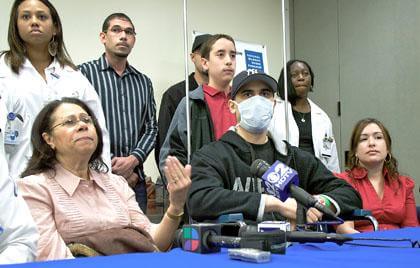By Anna Gustafson
When Kew Gardens resident Celeste Jimenez discovered her son Cesar Jimenez’s leukemia had returned, she was devastated.
After all, Celeste Jimenez thought her 32−year−old son, a former Queens Village resident, was in the clear. Diagnosed two years ago with leukemia, he had responded well to his chemotherapy and had even returned to work at the Metropolitan Transportation Authority this April.
“My son was a health nut,” Celeste Jimenez said. “He worked out every day, he ate right, he ate organic food. That is what made it shocking when he was diagnosed with leukemia and when we got the latest news.”
Cesar Jimenez, who now lives in Brooklyn with his wife, Anne Marie Jimenez, and 14−year−old son, Christian Cesar, relapsed in July and has been spending his nights and days in the Long Island Jewish Medical Center in New Hyde Park since Oct. 1.
According to his doctor, Linda Russo, the intense chemotherapy Cesar Jimenez is currently undergoing is not enough to save him and he needs a bone marrow donation in order to survive.
“Cesar has acute lymphoblastic leukemia, and the cure rate for ALL is 30 to 35 percent,” Russo said Friday morning at a bone marrow drive held by the LIJ medical center. “When the patient relapses, the cure rate goes way down with little chance of survival without a bone marrow transplantation.”
Cesar Jimenez’s friends and family joined him and Russo Friday morning at the bone marrow drive to announce the need for more U.S. residents to become bone marrow donors and Russo said it is especially important for minorities to donate.
“The chance of a patient having a complete match is about 25 percent, and that percentage goes way down with patients with an ethnic background,” Russo said.
Of the 6 million people in the national bone marrow registry, about 7 percent are Hispanic. Among Hispanics, there is a one in 20,000 chance that a match will be found between a donor and recipient.
A person who needs a bone marrow transplant must receive marrow from someone whose tissue type is similar to their own. Tissue types are inherited, like hair or eye color, and therefore it is more likely that a donor who comes from the same racial or ethnic group as the recipient will have the needed tissue traits.
“There are a lot of myths about bone marrow donation,” said College Point resident Albert Rodriguez, Cesar Jimenez’s best friend who has been encouraging friends to become part of the nationwide bone marrow registry. “People think it’s painful, but it’s not at all. It doesn’t take a lot of time and you’re saving somebody’s life.”
The test to check for a bone marrow match involves a “simple cheek swab,” Russo said.
Should an individual turn out to be a match, the process to actually donate the bone marrow takes about two hours or less, according to Melanie Diaz, Cesar Jimenez’s nurse practitioner. In most cases, individuals usually donate stem cells through a process similar to a blood donation.
“There’s no surgery,” Diaz said.
More than 100 people signed up to be part of the blood marrow registration at the medical center’s drive, and Rodriguez and Cesar Jimenez’s wife said they are hoping to encourage friends and family to attend bone marrow drives in the near future.
Life has not been easy for Cesar Jimenez’s family. His mother said she relies on her faith to help her deal with her son’s sickness and his wife said it is often difficult to stay sane.
“I sleep here in the hospital, I go to work, I try to see my son,” Anne Marie Jimenez said. “Having friends and family with you helps.”
Though Cesar Jimenez said he often feels depressed, he said he keeps his hopes toward the future. Someday, he said, he hopes life can go back to normal. He can lift weights like he used to and spend time with his family outside of a hospital bed.
“I’ll be glad to go back to work,” he said. “I won’t take anything for granted for the rest of my life. I’ll do as much as I can for my family.”
Cesar Jimenez’s friends and family are sponsoring two upcoming bone marrow drives. The first drive will be held this Sunday, Oct. 26, from 9 a.m. to 5 p.m. at the Hispanic Transit Society Hall on 450 Soundview Avenue in the Bronx. The second will be held Monday, Oct. 27, from 10 a.m. to 4 p.m. at Hofstra University in the student atrium. For more information, call (866) 336−4252.
Reach reporter Anna Gustafson by e−mail at news@timesledger.com or by phone at 718−229−0300 Ext 174.



































